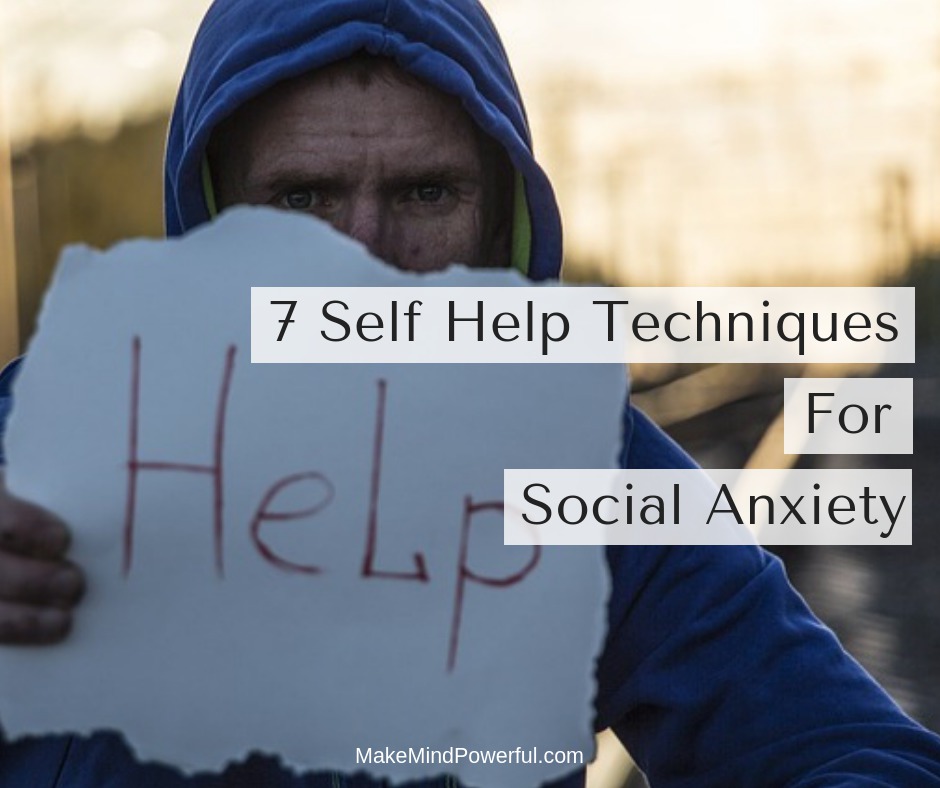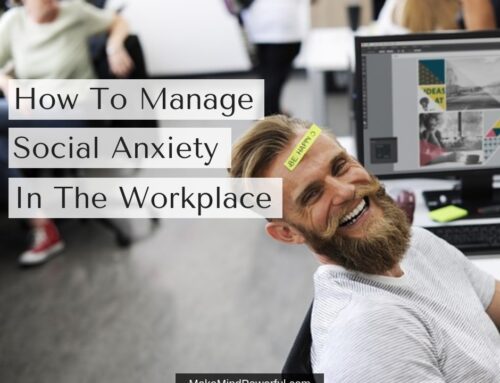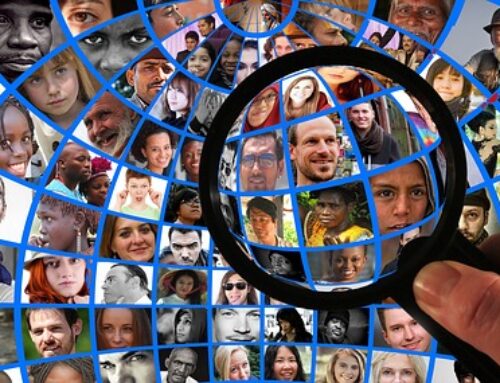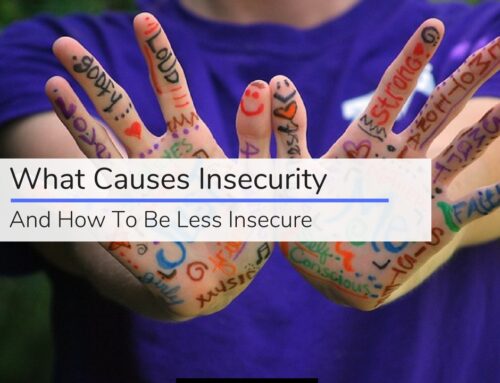Did you avoid social gatherings because you fear how you may appear foolish to others? Or does a single botched presentation in college haunts you in your working days? If you’re silently nodding in your mind, chances are, you are suffering from social anxiety disorder.
It is possible to mistaken social anxiety for shyness and in some cases, introversion. I spent more than 10 years dealing with social anxiety without knowing what I’m against with. At some points, I thought that’s what’s being introvert is all about.
What Is Social Anxiety
Social anxiety, according to the Anxiety and Depression Association of America, is defined as an intense fear of being judged, evaluated and rejected in social interactions. In other words, you’ll make hundreds of excuses to avoid talking to people because you’re afraid of sounding foolish.
For instance, I cringed when speaking up in group discussions during my years at the university. Thoughts like ‘what if my ideas are ridiculous?” would induce more fear when sharing my points. If you have social anxiety, you’ll be making thousands of excuses to avoid birthday parties, social gatherings and any sorts of celebrations.
Common Symptoms Of Social Anxiety Disorder
Are there any telling signs of social anxiety? Can you tell if you’re suffering social anxiety disorder?
Yes.
At first glance, it may seem that you’re merely shy or just being an introvert. But social anxiety disorder has distinct symptoms that are obvious.
- Fear of being judged – Going out in public becomes a nightmare. You’ll feel that every stranger is staring, and you’re wondering if you put on the wrong attire. It got worse when it comes to speaking up. You’ll juggle with words hundreds of time in your mind before voicing out.
- Low self-esteem – There are times where you had a bad day and feel that you’ve accomplished nothing. For people of social anxiety, they live through each day beating up themselves for not being good enough.
- Blushing – Unfortunately, symptoms of social anxiety are not confined to emotions and thoughts. You may find yourself blushing when speaking to others. It’s an embarrassing moment because you feel everyone could notice how your face just turned red.
- Panic Attacks – You’ve promised to show up at a birthday party. Before you step in, you experienced sudden shortness of breath and rapid heartbeat. Your instinct told you that you need to get back home as a feeling of fear overwhelms you.
- Other physical symptoms – People with social anxiety also display symptoms like trembling, excessive sweating, stuttering, and dizziness when they are exposed to social interactions.
What Causes Social Anxiety
You don’t become socially anxious overnight. Often, it is a progression of symptoms that seem to deteriorate as time passes. Therefore, it’s hard to pinpoint what really causes your social anxiety. In many cases, there are more than one factors.
Here are the common causes of social anxiety that you may have experienced in the past.
- Bullying – If you’ve been a target of bullies during school days, the resentment may result in social anxiety later on in life.
- Public humiliation – Social anxiety is also attributed to public shaming, such as being punished in public at school. Experiences such as blanking out during public speaking also contribute to social anxiety.
- Abuse – People who suffered from physical and sexual abuse loses their faith in society. Both the distrust and traumatic experience leads to a fear of social interaction.
- Genetic – Some individuals are more likely to develop social anxiety disorder. Research has suggested that genetic factor plays an important role in causing social anxiety.
Can Social Anxiety Be Overcome?
When you have suffered from social anxiety for a lengthy period, your confidence is anything but rock solid. It may seem impossible to shake off the fears that have been around for as long as you could remember. Addressing the crowd on a stage is totally beyond imagination.
Yet, social anxiety can be overcome, even if you’ve been struggling for years. It takes great effort and determination to try what works for you and not shy away from the discomfort you’ll experience. That’s how I finally managed to get rid of social anxiety after at least 15 years.
With that said, it is not going to be a pleasant battle. There will be days when it seems that you’re making good progress and self-esteem on a high. Then, a sudden trigger may push you a few steps back. What’s important is you keep working on it, even if you are not feeling great.
Eventually, you’ll find that speaking to strangers isn’t so terrifying anymore. And you start caring less about what others think about you. This doesn’t happen out of sudden. It’s a step-by-step progress where you barely notice that you’re inching forward in your effort.
Self Help Techniques For Social Anxiety
As far as I’m concerned, there isn’t a single remedy that could get rid of social anxiety. It’s always the combination of a few techniques that are practiced consistently that allows individuals to shake off the social phobia. Here are what I’ve tried.
1. Mindfulness Meditation
If you’ve never tried mindfulness meditation, you may assume that it’s a mental technique that allows you to clear your mind from all thoughts. This is a common misconception for people who pick up meditation to silence their thoughts. As long as you’re alive, you can’t stop your mind from thinking.
Instead, mindfulness meditation is a practice that let you be at peace with your own thoughts and emotions. Instead of reacting to every single thought, it allows you to disassociate from them and remain in the present. Often, a meditation can result in a pleasant and calm state of mind when practiced regularly.
But how does mindfulness meditation helps with social anxiety?
Remember how anxiety overwhelms you when you step into an ongoing party and you feel vulnerable as if every eye in the room are staring at you. In normal circumstances, you’ll excuse yourself from the event and rush back to the safe haven of your home. But when you’re mindful, you’ll stop reacting to these anxious thoughts.
Mindfulness allows you to observe the thoughts and emotions as they were. It allows you the choice to strip them of any power over your action. You’ll start to notice that the emotions that you felt did not reflect the reality of the situation. Most of the time, other people are engaged in their own thoughts and are not judging you.
Read: How To Learn Mindfulness Meditation On Your Own
2. Self-Hypnosis
Like you, I once thought that hypnosis is about staring at a clock watch and falling asleep after the count of 3. Then, the hypnotist would trample on your memories and start digging out the truth in you. After undergoing my first hypnosis session, I realized that hypnosis is anything but that.
In fact, there are too many misconceptions of hypnosis brought by TV dramas and movies that stopped people from trying this effective technique. Hypnosis is actually a form of alternative psychotherapy that is practiced by medical experts to treat mental disorders.
Hypnosis is actually a process that encourages learning in a superconscious state. Some experts argue that the subconscious mind is brought to the fore during a hypnotic trance and that explains the effectiveness of suggestions used during hypnosis.
Regardless of the causes of social anxiety, you have developed a string of habits over time. This results in a physical change of the brain in a phenomenon called neuroplasticity. Hypnosis can be used to remove the habits that cause you to think and react negatively to social triggers.
For instance, I’ve used this self-hypnosis audio to change the way I subconsciously react when entering a room full of strangers. In a way, it increases self-esteem, which helps terribly when you’re struggling with social anxiety. Of course, getting an appointment with a trained medical hypnotherapist is preferable, but this is the next best thing to cope with social anxiety at home.
3. Working Out
When was the last time you actually sweat because of working out and not due to the sweltering heat of summer? If you can’t recall, it’s time to hit the gym again or join a yoga class. Working out does wonder to both your physical and mental health.
Getting six-pack abs is a lofty goal but it’s what happens at the brain that gives you the positive energy to overcome social anxiety. Working out produces endorphin, a hormone that elevates your mood naturally. It has a euphoric effect that changes the perspective you have in certain situations.
Of course, going to the gym can be a tall order initially, when you’re having reservations in interacting with others. The same applies to take a jog in public. You may be insecure and keep obsessing about what others are thinking about you.
You can reframe those thoughts by realizing that others are probably focusing on their own workout or activities to pay any attention to you. And often, this is the truth when you’re working out in a gym.
To further boost your confidence in overcoming social anxiety, you can set goals during your work-out regime. For instance, you may want to shed off a couple of pounds in a week and work towards that. The end result is a healthier self and sky-high confidence for hitting your goals.
Read: Amazing Mental Health Benefits Of Exercise
4. Facing The Fear
Fear is a natural emotion that helps humans to protect themselves when threatened. People with social anxiety felt the same fear when being forced to conduct a presentation at work, or say “hello” to a stranger. Fear is helpful when your life and safety is at risk, but it’s not when you’re up against an imaginary threat.
Often, emotions triumph logic and that’s why it feels like jumping into a cliff when you’re trying to present your ideas to a crowd of people. But if you’re serious about overcoming social anxiety, you’ll need to face your fear, sooner or later. Some would argue that confronting your fear can lead to further trauma, but I am the walking example that it could help with social anxiety if done the right way.
It would be foolish to attempt something fearful unprepared. The same applies to conduct a presentation, public speaking or even simple things like greeting a stranger ( which can be very difficult). Preparation is key. You’ll want to research, rehearse, or in the cases of greeting a stranger, reminding yourself to smile.
You can’t climb a mountain if you’re panting after climbing a flight of stair. Facing your fear means taking things one step at a time. You start by taking an inch towards your social fears. And then you take longer steps. As the confidence builds up in momentum, you take the final plunge in the end.
This is the same method that I’ve used to finally step up and speak on a stage. Of course, there’s going to be more miss and hits the first time. But when you’ve taken the plunge, you’re courageous enough to take hits from mistakes and move on from there.
5. Compartmentalizing
Compartmentalizing is the natural ability of human being. It is an act where you’re focusing your thoughts on certain issues and neglect others. For instance, we are living in a world where the possibility for our safety and life being threatened is real. But as our mind works in compartments, we don’t usually dwell on these issues and that allows us to live without extreme fear.
Some may associate compartmentalizing with avoidance where we avoid from facing the truth. But in many cases, such as losing a loved one, our mind would naturally compartmentalize the news and gradually releases the emotion. This allows our brain to withstand the emotional shock of reality.
You can put compartmentalizing into good use to temporary manage social anxiety. It’s true that you’ll want to face the fear later on but it’s also important to function while you’re working on other aspects.
For example, you know you can’t avoid the upcoming presentation in college, or suffer a blow in your grade. You could break the process into compartments by focusing only on the act of carrying out the presentation. By zoning all your attention to the delivery, you block off thoughts on the reactions of the crowd or mistakes that you may make.
6. Helping Others
It seems ironic but helping others can help ourselves in overcoming social anxiety. Regardless of monetary contributions or joining in volunteer works, you can rejoice in the meaningful works done to assist people who are in worse situations.
The idea that you’re empowered to help somebody else increases self-esteem. You’ll no longer consider yourself worthless, as you have made a difference in someone’s life. This means much more than being able to speak publicly or striking a conversation with strangers.
Of course, it will be intimidating if you’re to approach strangers in need and offer your help. Instead, it will be a better approach to join local non-profit communities. These communities are typically friendly and non-judging, which are ideal for volunteers who are socially anxious.
As you’re focused on helping others, you have no time to be self-conscious. And helping others also allow you to develop social skills in a relaxed environment and at your own pace.
7. Be A Good Listener
When you realized you have poor social skills, you feel pressured in a conversation. On top of the existing fear of interaction, you heaped more pressure on yourself when talking with someone. This often ends in an awkward conversation or a total shutdown on your part.
You have to fear your fear but you have to do it right. Instead of rushing into replying, try to be a good listener. People enjoy being listened to and appreciate that you’re paying attention to their thoughts. When you’re focused on listening, you forgot to be self-conscious.
Strike up meaningful conversations by asking questions that you’re genuinely interested in. It doesn’t matter that you’re not initiating the conversation. By asking questions, you tend to build long-lasting relationship compared to meaningless small talks.
It will be impossible for you to get into a conversation with strangers right now. Start by talking with someone you’re comfortable with. Be a good listener and refrain from cutting in. Try to interpret the emotions behind the words. You’ll be surprised how much more you could learn when you truly listen.
Final Thoughts
Remember that social anxiety disorder didn’t happen overnight. I would be lying if I say you could overcome social anxiety within a week or two. Expect to be in a marathon rather than a short sprint. I knew I came a long way when I stepped on the podium for the first time ever to speak to hundreds of people.
How long have you been struggling with social anxiety? What have you tried to overcome it? If you have more self-help techniques for overcoming social anxiety, share them in the comment below.
Related:
- How To Get Rid of Social Anxiety (Even If It Seems Impossible)
- 7 Signs You Are Beating Social Anxiety Just By Doing The Right Thing
- 11 Best Jobs For People With Social Anxiety Disorder
- Social Media And Social Anxiety – Does One Lead To The Other?
- How To Unclutter Your Mind And Stop Worrying








Leave A Comment